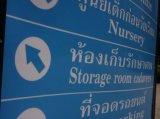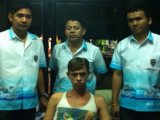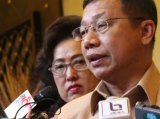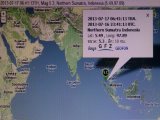PHUKET: Eleven Rohingya detainees have staged a breakout from an Immigration centre north of Phuket as Thailand's policy on boatpeople faces more serious challenges.
The 11 men escaped from the centre in the province of Phang Nga sometime between midnight and 3am today, Immigration Superintendent, Colonel Neti Kanboon, said tonight.
Increasing numbers of boatpeople, ''rescued'' from smugglers' camps or apprehended on passing boats in January, are now opting to flee detention in Thailand whenever an opportunity arises.
So far this month, 19 women and children have fled a family centre in Phang Nga. On Phuket, all 29 women and children once held at the family centre on the island have already vanished.
With a nine-months pregnant woman among the recent absconders from Phang Nga, the message is plain: Rohingya boatpeople do not wish to be held indefinitely in Thailand with their status and futures undetermined.
Back in January, the Thai Government set itself a six-month deadline for a decision on what should happen with the captive Rohingya. That deadline will be reached next week with no practical options apparent.
No ''third country'' has emerged to offer to accept the Rohingya, the boatpeople clearly do not want to be kept in Thailand and to return them to Burma (Myanmar) would be unconscionable.
With no Rohingya left at the Phuket shelter for women and children and the number housed in the Phang Nga shelter reduced from 72 to 43, the boatpeople are plainly voting with their feet.
The family shelters give the women and children the freedom to escape if they choose. It's different at the Immigration centres, where the men are virtual prisoners.
Secret footage taken earlier this year at Phang Nga Immigration by Britain's Channel 4 showed cramped and crowded conditions that have since been alleviated and improved, a recent visit by Phuketwan indicated.
Yet in Sadao Immigration centre in Songkhla province, one of about 20 centres throughout Thailand where Rohingya are being held, there have been seven deaths in custody since January, according to Amnesty International.
The Rohingya, with husbands separated from families and a sense of despair growing with every day their status remains undetermined, are likely to continue to make their own choices about their futures.
The 11 men escaped from the centre in the province of Phang Nga sometime between midnight and 3am today, Immigration Superintendent, Colonel Neti Kanboon, said tonight.
Increasing numbers of boatpeople, ''rescued'' from smugglers' camps or apprehended on passing boats in January, are now opting to flee detention in Thailand whenever an opportunity arises.
So far this month, 19 women and children have fled a family centre in Phang Nga. On Phuket, all 29 women and children once held at the family centre on the island have already vanished.
With a nine-months pregnant woman among the recent absconders from Phang Nga, the message is plain: Rohingya boatpeople do not wish to be held indefinitely in Thailand with their status and futures undetermined.
Back in January, the Thai Government set itself a six-month deadline for a decision on what should happen with the captive Rohingya. That deadline will be reached next week with no practical options apparent.
No ''third country'' has emerged to offer to accept the Rohingya, the boatpeople clearly do not want to be kept in Thailand and to return them to Burma (Myanmar) would be unconscionable.
With no Rohingya left at the Phuket shelter for women and children and the number housed in the Phang Nga shelter reduced from 72 to 43, the boatpeople are plainly voting with their feet.
The family shelters give the women and children the freedom to escape if they choose. It's different at the Immigration centres, where the men are virtual prisoners.
Secret footage taken earlier this year at Phang Nga Immigration by Britain's Channel 4 showed cramped and crowded conditions that have since been alleviated and improved, a recent visit by Phuketwan indicated.
Yet in Sadao Immigration centre in Songkhla province, one of about 20 centres throughout Thailand where Rohingya are being held, there have been seven deaths in custody since January, according to Amnesty International.
The Rohingya, with husbands separated from families and a sense of despair growing with every day their status remains undetermined, are likely to continue to make their own choices about their futures.

















